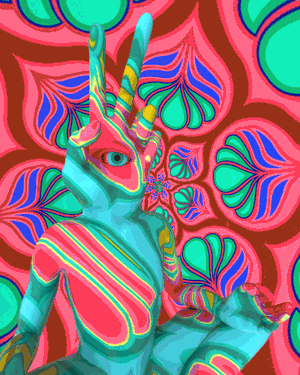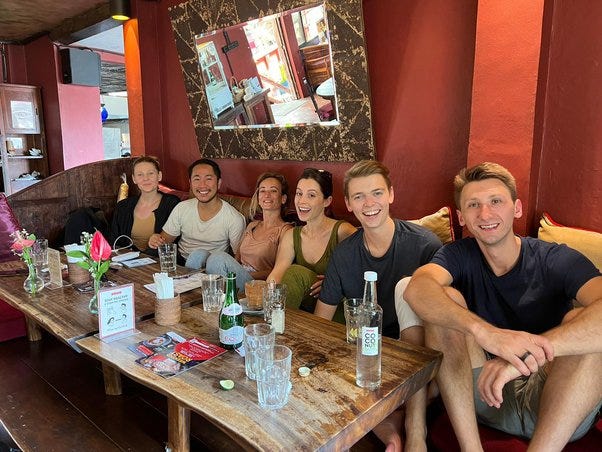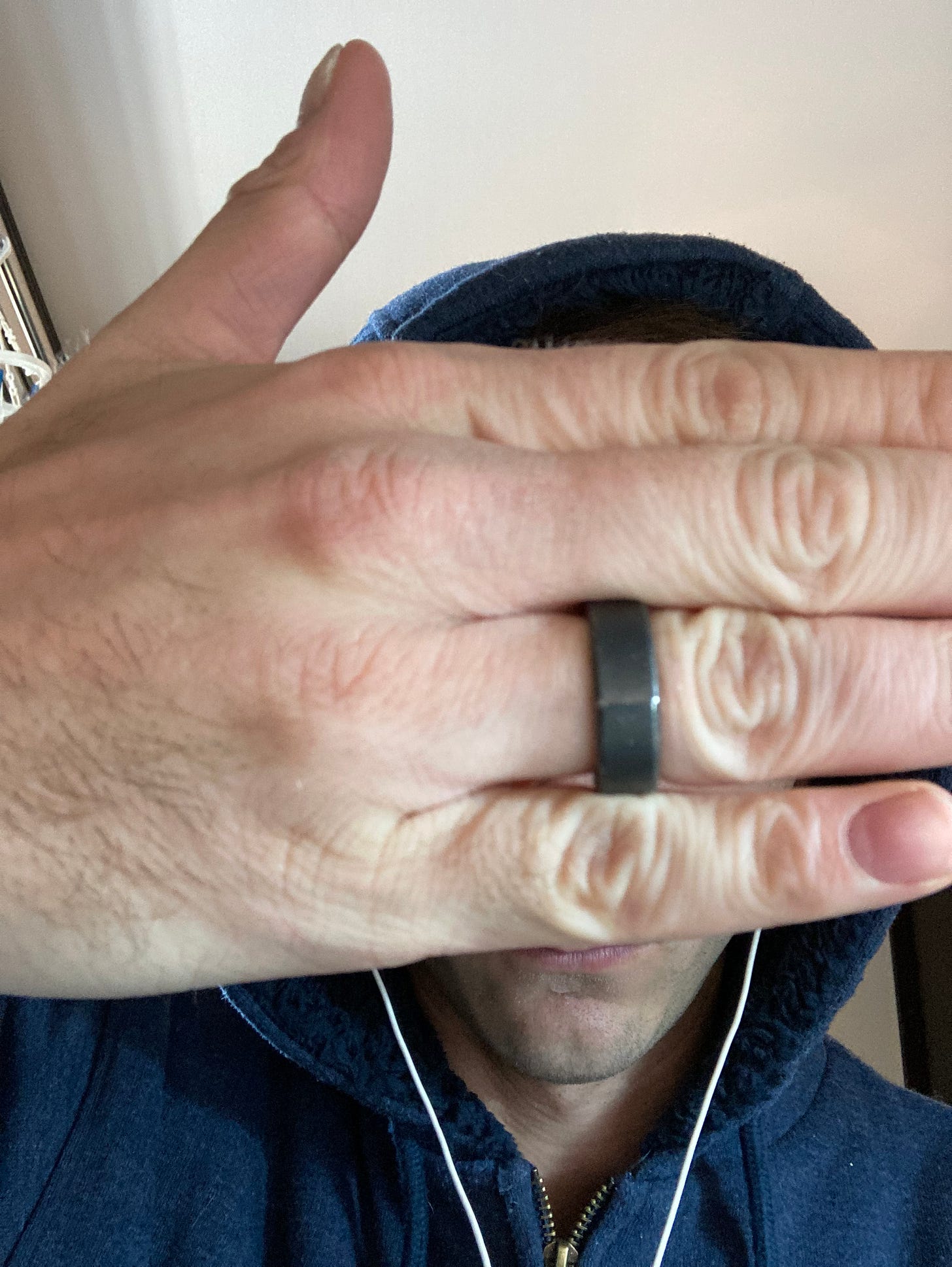Solitary confinement or freedom?
Insights from fellow meditators and geeking out with my Oura ring (burnout, part 10)
Last week I wrote about my journey into silence and decision to go on multiple meditation retreats. After the end of my first retreat I called it quits on my startup and felt a greater sense of freedom than ever before. This week I share more about what it’s like to be in silence, sharing the insights of friends I made on retreat, and what happened after a total of twenty days in meditation according to my Oura ring.
1/ Night and day
My second 10 days in silence came shortly after the first, but was completely different. There were no electric currents shooting through my body. I wasn’t balling my eyes out and ridding myself of past traumas (in fact, I didn’t cry once this time). And thankfully, unlike last time, my tongue did not turn into a snake.
The meditation was calm, peaceful and had a “cool” feeling throughout. I felt balanced and like I had hit a new high, but without all the fanfare. Because I’d decided to quit my startup, that huge burden was off my shoulders, and it felt like I could really get into the meditation more seriously without worrying about my future.
I felt less like this:
And more like this:
I’ve sometimes wondered about the similarities between solitary confinement and doing a prolonged silent meditation retreat. I think it’s pretty different. Prisoners are not there by choice, and they rarely have any meditation skill. They are left with their own thoughts in a six by nine foot cell with no prior training and can literally go insane. There are initiatives, like the Mindfulness Peace Project, to teach meditation to prisoners in solitary confinement to make it more manageable. But most people won’t get this training.

My retreat was not like involuntary solitary confinement. I didn’t go crazy. In fact, in the silence — and repeating the same meditation technique moment after moment — I found peace.
A meditation teacher was once asked why he meditates. His response was,
“So I will see the tiny purple flowers by the side of the road as I walk to town each day.”
After a few days I began to notice a real beauty in the simplest of things. For example, the large spiders spinning their webs in the corner of the bathroom, which might normally be alarming, were absolutely fascinating to watch. The stars, the sky, and the bowl of cold oatmeal were all equally mesmerizing.
There were no worries about the past or future. The thoughts that did come up popped and evaporated like little soap bubbles.
Just being alive in this moment was enough.
2/ What it feels like after the retreat is over
I talked to some fellow meditators after the retreat and recorded their responses. I thought you might find it interesting to listen to. I’ve included the audio clips and short quotes from each.
Dimitri —
“After feeling bodily sensations I had a lot of memories. I just observed them…and was able to keep the balance of my mind. I had a lot of healing from old patterns and behaviors.”
Aleksey —
“On a certain day it felt like I stopped getting thoughts. I stopped worrying about anything on the retreat.”
Guzal —
“It’s clear that the mind gets really crazy sometimes. I normally become my thoughts and the mind gets so tangled up. The mind can take you anywhere – when you are traveling in your mind to the past or future, it dilutes the present moment. But now I see that I can get some space from the thoughts. Now before reacting, I can take a second to notice, and then respond more skillfully.”
David —
“Feeling relieved that the ten days are over. Also I’m feeling very empowered, refreshed, and I’m super glad that I did this for the second time. Every single person’s experience on Vipassana is different. There are a lot of very strong emotions that come to the forefront as you meditate and think about life…”
Niles —
“As a course manager and server during the retreat, I could still read and use my phone but also meditate several hours a day. It was challenging to switch gears and was challenging but was good practice for balancing this in the real world.”
Liz —
“This has been challenging for me but overall I took away a lot. We’re made to sit 12 hours a day and there’s a lot of strain and stress. But eventually you realize that a lot of this stress is more mental. As the days went by our stamina increased and it was a lot easier to sit. This is something we can take into our daily lives.”
Erin —
“The container of the ten days in silence is a very special container. This rush of feeling and emotions after breaking silence is quite amazing. I went through such a wide range of emotions. The middle of the ten days felt quite euphoric. I think it was such a gift to have this experience.”
Jerome —
“Wow, it was wonderful. It’s peaceful inside. The waves aren’t finished now – so much love, harmony, storms…”
Adrien —
“Living like a monk for ten days is a crazy experience and I definitely am happy I did it. It’s a great tool to better learn how to control your emotions, desires and how to behave. It’s been hard physically and mentally but in the end I really encourage everyone to do it.”
3/ Are you sleeping or meditating?
I wore my Oura ring during both retreats to measure my heart rate, sleep patterns and my heart-rate variability. The data didn’t save properly for all days on the first retreat in March but it did for the second retreat in May. It’s incomplete but still gives me a decent picture.
My resting heart rate was 39 BPM and at least one BPM lower on average for the second retreat. Lower average BPMs are linked to longer lifespan, so I’ll take that as a positive. (I have an abnormally low resting heart rate, by the way, probably because I did a lot of cardio in the past).

I went to bed around 10pm but I often laid there and meditated until midnight, and then woke up at 4am at the sound of the gong. Strangely enough, I would still feel great despite the lack of sleep.
When you meditate ten hours a day (depending on the type of meditation you do), it will impact your sleep. Concentration-based meditation practices can increase awareness of your bodily sensations, thoughts, and emotions. This can make you hypervigilant, which can actually make it difficult to fall asleep. This is probably what I was experiencing.
That said, there’s some evidence that shows meditation can “replace” sleep. While I was technically getting less sleep, my Oura ring thought I was getting more because it couldn’t tell the difference between deep sleep or REM sleep and meditation! Here’s what my sleep stats looked like:
Keep reading with a 7-day free trial
Subscribe to Misha Yurchenko's Newsletter to keep reading this post and get 7 days of free access to the full post archives.







